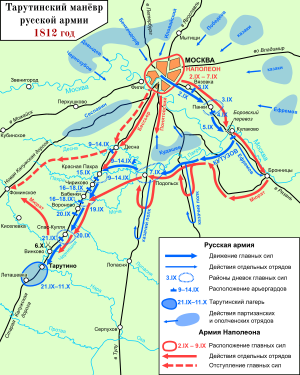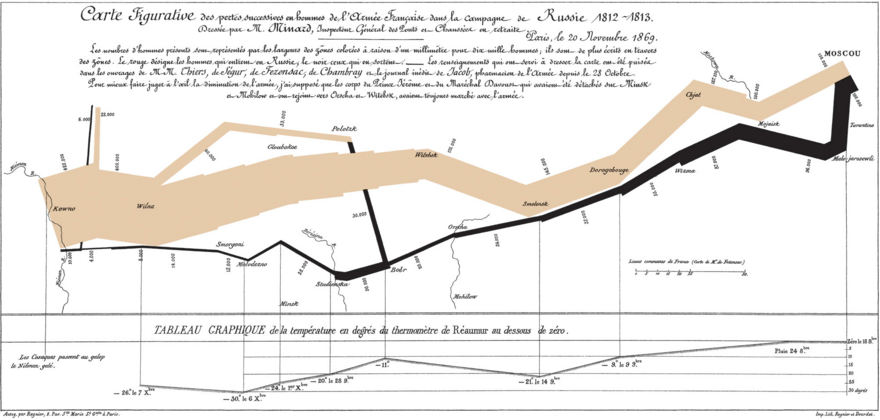Mikhail Kutuzov facts for kids
Quick facts for kids
Mikhail Kutuzov
|
|
|---|---|
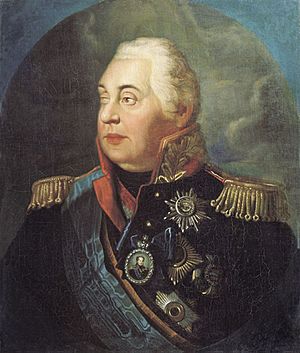 |
|
| Born | 16 September 1745 Saint Petersburg, Russian Empire |
| Died | 28 April 1813 (aged 67) Bunzlau, Kingdom of Prussia (now Bolesławiec, Poland) |
| Buried | |
| Allegiance | |
| Service/ |
|
| Years of service | 1759–1813 |
| Rank | Field marshal |
| Commands held | Commander in Chief of Austro-Russian force in the Third Coalition Commander in Chief of Imperial Russian Army in Patriotic war of 1812 |
| Battles/wars |
|
| Awards | Duke of Smolensk 1st class Order of St. George |
Prince Mikhail Illarionovich Golenishchev-Kutuzov (born September 16, 1745 – died April 28, 1813) was a famous Field Marshal of the Russian Empire. He was a military leader and diplomat who served under three Russian emperors: Catherine the Great, Paul I, and Alexander I. Kutuzov was shot twice in battle against the Turks but survived his serious injuries. He is best known for defeating Napoleon during the Patriotic War of 1812. Emperor Alexander I praised Kutuzov as one of Europe's most famous commanders.
Contents
Early Life and Military Training
Mikhail Kutuzov was born in Saint Petersburg, Russia, on September 16, 1745. His father was a respected general in the army. His mother came from a noble family. Because of his parents, Kutuzov had connections with the royal family from a young age.
In 1757, when he was 12, Kutuzov joined a special military school. He was very smart and quickly became popular. He learned military skills and also spoke French, German, and English fluently. Later, he learned Polish, Swedish, and Turkish. These language skills helped him a lot in his career. By 1760, he was even teaching mathematics at the school.
In 1762, Kutuzov became a captain in the Astrakhan Infantry Regiment. This unit was led by Colonel Alexander Suvorov, a very skilled commander. Kutuzov learned a lot from Suvorov, including how to lead soldiers effectively. Suvorov taught him that orders should be simple and clear. He also believed that a commander should care about his soldiers' well-being. Kutuzov learned to lead from the front, showing bravery to his troops. This helped him build strong relationships with his soldiers, which was important for his future success.
Fighting in Early Wars
In 1768, the Ottoman Empire declared war on Russia. Kutuzov, now a major, joined the army fighting the Turks in the south. He fought bravely but did not receive medals at first. Later, he was transferred to fight the Turks and Tatars in the Crimea. Here, Kutuzov learned how to use Cossack light cavalry, a skill that would be very useful against Napoleon in 1812.
In 1774, Kutuzov was ordered to attack the town of Alushta in Crimea. When his troops struggled, he grabbed a fallen flag and led the charge himself. During this attack, he was shot in the left temple. The bullet went through his head and came out near his right eye. This was a very serious injury, and doctors thought he would die. However, Kutuzov slowly recovered, though he often had pain and dizziness. His right eye was permanently damaged and twisted. He left the army that year because of his wound.
Kutuzov traveled to Europe for better medical care. In Berlin, he spent time with King Frederick the Great of Prussia, discussing military tactics. He also went to London, where he learned about the American Revolutionary War. He studied how American General George Washington used a strategy called attrition warfare against the British. This taught Kutuzov that you don't always need to win big battles to win a war.
Kutuzov returned to the Russian Army in 1776 and served again under Suvorov for six years. He learned that letting soldiers use their own intelligence made the army stronger. Suvorov also taught him to use quick movements on the battlefield. By 1782, Kutuzov was a brigadier general. Suvorov saw Kutuzov's potential as a smart leader. In 1787, Kutuzov was wounded again in the left temple, in almost the same spot. Doctors again feared for his life, but he recovered, though his right eye became even more twisted.
By 1784, he became a major general. He fought well in the Russo-Turkish War (1787–1792) at places like Ochakov and Izmail. He became a lieutenant general in 1791. He also served as an ambassador in Istanbul and Berlin, and as governor-general of Saint Petersburg.
Kutuzov was liked by Tsar Paul I. After Paul I was killed, Kutuzov was temporarily out of favor with the new emperor, Alexander I, but he remained loyal.
Facing Napoleon
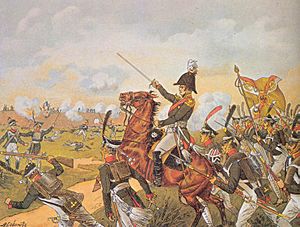
In 1805, Kutuzov led the Russian army against Napoleon. However, Napoleon quickly defeated Russia's Austrian allies at Ulm before the Russian and Austrian armies could join forces.
Kutuzov was at the Battle of Austerlitz on December 2, 1805. Before the battle, Kutuzov tried to convince the Allied generals to wait for more soldiers. But Emperor Alexander I believed that waiting would look cowardly. Alexander ignored Kutuzov's advice and forced the Russian army to move off a key high ground called the Pratzen Plateau. Napoleon quickly took this high ground and used his cannons to attack the Allied lines. The battle was lost, and many Russian soldiers died. Alexander was very upset, and Kutuzov was put in charge of leading the army's retreat.
Later, Kutuzov led the Russian army against the Turks in another war (1806–1812). Knowing that Russia would soon need its armies to fight the French, he quickly ended the war. He signed the Treaty of Bucharest, which added new land to the Russian Empire.
The Patriotic War of 1812
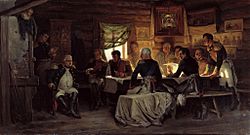
When Napoleon invaded Russia in 1812, the Russian Minister of War, Michael Andreas Barclay de Tolly, decided to retreat and use a "scorched earth" strategy. This meant burning crops and supplies so the French army couldn't use them. Many Russian generals and soldiers did not like this plan. After the Battle of Smolensk, Emperor Alexander I had to choose a new general. He chose Kutuzov.
Kutuzov was very popular with the troops because he was Russian and had proven himself brave in battle. He also cared about his soldiers. The nobles and clergy also respected him. So, when Kutuzov was made commander-in-chief on August 17, 1812, Russians supported him. Only Emperor Alexander I was not happy, as he blamed Kutuzov for the defeat at Austerlitz.
Within a week, Kutuzov decided to fight a major battle near Moscow. He moved his troops further east to prepare. Two huge armies clashed near Borodino on September 7, 1812. Nearly a quarter of a million soldiers fought. Napoleon's army suffered heavy losses, with about a third of his soldiers killed or wounded. Although Russia also lost many soldiers, the Russian army was not destroyed.
On September 12, after a meeting at the village of Fili, Kutuzov made the difficult decision to abandon Moscow without fighting. This meant losing the city to Napoleon, but it saved the Russian army. The people of Moscow were evacuated. Kutuzov then moved his army to the rich southeast of Moscow, to a place called Tarutino. Here, he could protect his army and wait for Napoleon's retreat.
Kutuzov avoided large frontal battles. His plan was to let Napoleon's army weaken itself. This strategy was criticized by some, including Emperor Alexander I. On October 18, Russian forces surprised Napoleon's army at the Battle of Winkovo. Napoleon tried to move around Kutuzov, but on October 24, he was stopped at Maloyaroslavets. This forced Napoleon to retreat north, back along the same path he had used to advance. This route had already been devastated, meaning there was little food or supplies for his army.
Kutuzov's army followed Napoleon, attacking him at the Battle of Vyazma, the Battle of Krasnoi, and the Battle of Berezina. Small groups of Cossacks and peasants also attacked isolated French units during their retreat. Kutuzov's strategy of attrition warfare worked. By December 14, most of Napoleon's army had left Russia. Out of 612,000 soldiers who entered Russia, only about 110,000 remained.
For his victory, Emperor Alexander I gave Kutuzov the special title of His Serene Highness Knyaz Golenischev-Kutuzov-Smolensky on December 18, 1812.
Death and Lasting Impact
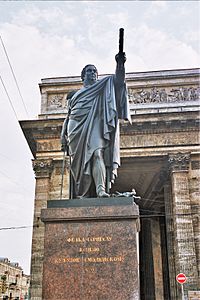
In early 1813, Kutuzov became ill. He died on April 28, 1813, in Bunzlau, which is now Bolesławiec, Poland. Monuments have been built in his honor there, at Poklonnaya Hill in Moscow, and in front of the Kazan Cathedral in Saint Petersburg, where he is buried.
Kutuzov had five daughters, but his only son died as a baby. Because he had no male heir, his family's lands went to the Tolstoy family, as his oldest daughter married Count Matvei Fyodorovich Tolstoy.
Today, Kutuzov is still highly respected in Russia. The famous writer Leo Tolstoy admired Kutuzov greatly. In his novel War and Peace, Kutuzov is shown as a kind and wise man who understood the true nature of war better than Napoleon. Tolstoy wrote that Kutuzov used his efforts "not to kill and exterminate men, but to save and have pity on them."
During World War II (which Russians call "The Great Patriotic War"), the Soviet government created the Order of Kutuzov. This award is still one of the highest military honors in Russia today. Also, a major military operation during World War II, the Orel Strategic Offensive Operation, was named "Kutuzov."
Many Russian towns are named "Kutuzovo" in his honor. A Sverdlov-class cruiser named for Kutuzov was built in 1954 and is now a museum ship in Novorossiysk.
What People Said About Kutuzov
- Napoleon called him "...the sly old fox from the north..."
- Leo Tolstoy described him as "...a simple, modest and therefore truly great figure..."
- His mentor Suvorov said, "...he is crafty. And shrewd. No one will fool him..."
- Emperor Alexander I once called him "...a hatcher of intrigues and an immoral and thoroughly dangerous character..."
- General Clausewitz saw him as "...a true Russian, a slightly reduced Suvorov..."
- Richard K. Riehn noted that "...Napoleon was the master of the short run, Kutuzov understood the long..."
Kutuzov's Personality
- He was handsome, strong, and an excellent horseman.
- He was very intelligent and skilled in mathematics, fortifications, and engineering.
- He knew a lot about religion, philosophy, law, and social sciences.
- He spoke Russian, French, German, Polish, Swedish, English, and Turkish.
- He was popular, entertaining, brave, quick-witted, and efficient.
- He showed courage and determination in attacks.
- He owned more than 3,000 serfs (people who worked on his land).
- He visited Berlin and discussed tactics with Frederick the Great.
- He studied the attrition warfare used by the American colonies against the United Kingdom.
- He was a happy grandfather.
- After being appointed commander in 1812, he went to a cathedral, knelt, and prayed.
- He was a member of Freemason groups in Moscow.
- He was described to Napoleon as a cool and calculating person, patient, and preparing for a tough war.
- Kutuzov told Alexander I that he had won the Battle of Borodino.
- He supported Aleksandr Figner, a partisan leader, and even increased guerilla warfare.
- He understood the value of armed peasant groups.
- He cried "Russia is saved" when he heard Napoleon had left Moscow.
- Kutuzov once said that destroying Napoleon completely might not be good for Russia, as it could lead to another country becoming too powerful.
Images for kids
See also
 In Spanish: Mijaíl Kutúzov para niños
In Spanish: Mijaíl Kutúzov para niños
- Kutuzov (film)
- War and Peace (film series)
| Military offices | ||
|---|---|---|
| Preceded by Pyotr von der Pahlen |
War Governor of Saint Petersburg Governorate 1801–1802 |
Succeeded by Mikhail Kamensky |
| Preceded by Alexander Tormasov |
War Governor of Kiev Governorate 1806–1809 |
Succeeded by Mikhail Miloradovich |
 | Kyle Baker |
 | Joseph Yoakum |
 | Laura Wheeler Waring |
 | Henry Ossawa Tanner |


